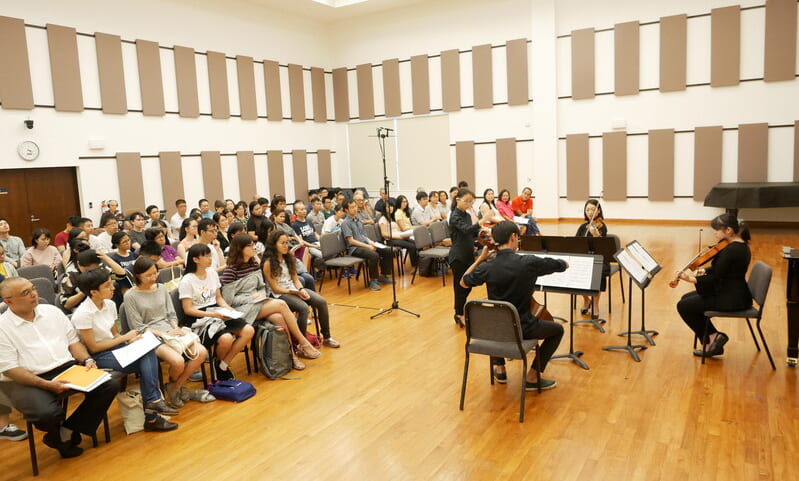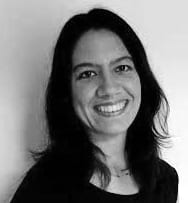Kat AGRES
Yong Siew Toh Conservatory of Music (YSTCM)
Kat talks about investigating the impact of incorporating cognitive science materials and learning strategies in her psychology of music performance course, and the extent to which students applied the cognitive science content to enhance their music performance practice.
 Photo courtesy of NUS Imagebank
Photo courtesy of NUS Imagebank
Agres, K. R. (2023, February 24). The interdisciplinary edge: Why and how to include cognitive science in a music conservatory curriculum. Teaching Connections. https://blog.nus.edu.sg/teachingconnections/2023/02/24/the-interdisciplinary-edge-why-and-how-to-include-cognitive-science-in-a-music-conservatory-curriculum/
As a cognitive scientist embedded within a conservatory of music, I often asked myself how the relevant concepts and analytical thinking style of my scientific discipline might be of use to the wonderful music students here at the Yong Siew Toh Conservatory of Music (YSTCM) at NUS. After all, cognitive science (CS), including psychology and performance science, has informed best practice in a number of applied areas, such as pilot training and sports practice (e.g., Williams & Leffingwell, 2002). Although CS research is increasingly being conducted to investigate and inform best practice in music performance (e.g., Williamon, 2004), there is generally little awareness and engagement from music students with this knowledge, as it is rarely formally taught1. One reason for this may be that it is not necessarily intuitive how to teach music students the concepts and analytical approaches from this scientific discipline.
Fast forward to 2021, which saw the first cohort of conservatory students in my new course MUA2230 “The Psychology of Music Performance”. In this post, I share about how, with generous grant support2, I was able to investigate3 1) what impact the CS course material has on the approaches that music students use in their practice and performance of music (termed ‘music performance practice’), and 2) how student-centred learning (SCL), and project-based learning (PBL) more specifically, may help support students’ learning, critical thinking, and engagement with this area.
Which teaching and learning (T&L) methods are best suited to support students in this type of interdisciplinary module?
As discussed in Agres and Ureyang (2022b), a variety of teaching and learning (T&L) methods were used in the course. Project-based learning (PBL) was chosen as one of the primary T&L methods because students “take responsibility for the learning process by setting goals, monitoring, reflecting, and sustaining their motivation,” and PBL has been shown to enhance student motivation, engagement, and learning outcomes (English & Kitsantas, 2013). While learning an instrument is clearly “hands-on”, to my knowledge, no prior approach has used PBL to help university music students internalise CS concepts in order to improve their performance practice, even though PBL is an ideal approach for this (Tobias et al., 2015). Through classroom activities, interactive blogs (SCL component), and individual projects (PBL component), music students engaged with the CS material to add analytical, empirical concepts and tools to their set of practice and performance techniques.
The results of our investigation showed that the T&L methods, especially the SCL and PBL components, were successful in deeply engaging the students, resulting in knowledge acquisition, critical thinking, and reflection (Agres & Ureyang, 2022b). While traditional T&L methods (e.g., lectures and readings) allowed for a greater breadth of knowledge to be learned, students were most engaged when crafting their individual research questions and driving their own learning through PBL. The findings suggested that a well-balanced teaching approach that incorporates elements of SCL and PBL is capable of instilling both breadth and depth of learning.
What can students gain from being exposed to relevant concepts from cognitive and performance science?
As elaborated in Agres and Ureyang (2022a), the course was shown to impact students’ music performance practice in several key areas, including: a) improving the efficiency of music practice sessions, b) helping students apply problem-solving techniques while practicing, c) adopting an analytical approach to monitoring their practice and performance, d) understanding the connection between the mind and body (and the importance of physical and mental health for music performance), and e) performing more confidently. In addition, students were able to foster a musician community through the interactive components of the course.
All in all, the findings from my investigation suggested that the course helped students practice more efficiently and effectively, employ analytical problem-solving to challenges encountered while practicing, and perform with greater control and confidence by tackling music performance anxiety. In addition, all students reported aiming to take forward at least one strategy or technique they learned in the class for their future music performance practice, which speaks to the impact of the material on the students.
Of course, the ideas here are not only applicable to music conservatory students–the broader messages are that 1) interdisciplinary insights can give students an advantage over those exposed primarily to material from one discipline, and 2) engaging teaching and learning methods are helpful for improving learning outcomes, critical thinking, and self-reflection.
Endnotes
- Two notable exceptions are the world-famous Indiana University (IU) Jacobs School of Music and The Juilliard School, which offer classes in music psychology.
- This research was made possible due to the generous support of a Teaching Enhancement Grant (TEG) from the Centre for Development of Teaching and Learning (CDTL).
- The results of these investigations were presented at the 35th International Society of Music Education (ISME) World Conference (Agres & Ureyang, 2022a, 2022b).
References
Agres, K. R., & Ureyang, N. (2022a). Improving students’ practice and performance of music by incorporating cognitive science into conservatory curricula. Proceedings of the 35th Conference for the International Society of Music Education (ISME 2022), 1-13.
Agres, K. R., & Ureyang, N. (2022b). Engaging deeply with cognitive science in a conservatory of music: Using student-centred learning to enhance learning outcomes in music students. Proceedings of the 35th Conference for the International Society of Music Education (ISME 2022). 1-15.
English, M. C., & Kitsantas, A. (2013). Supporting student self-regulated learning in problem-and project-based learning. Interdisciplinary Journal of Problem-Based Learning, 7(2), 6. https://doi.org/10.7771/1541-5015.1339
Tobias, E. S., Campbell, M. R., & Greco, P. (2015). Bringing curriculum to life: Enacting project-based learning in music programs. Music Educators Journal, 102(2). https://doi.org/10.1177/0027432115607602
Williamon, A. (Ed.). (2004). Musical excellence: Strategies and techniques to enhance performance. Oxford University Press.
Williams, J. M., & Leffingwell, T. R. (2002). Cognitive strategies in sport and exercise psychology. In J. L. Van Raalte & B. W. Brewer (Eds.), Exploring Sport and Exercise Psychology (pp. 75–98). American Psychological Association.
 |
Kat AGRES is a cognitive scientist, public speaker, educator, and cellist. In addition to spearheading music cognition research and teaching on the subject at the Yong Siew Toh Conservatory of Music, she is the founding Director of the YST Centre for Music and Health. Kat’s research investigates music perception and cognition, musical interventions and technology for health and well-being, computational creativity, music-based Brain-Computer Interfaces (BCIs), and the use of computational models to simulate music cognition and memory. Kat can be reached at muskra@nus.edu.sg. |

